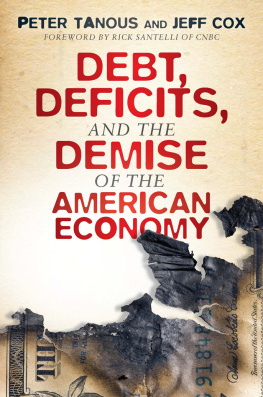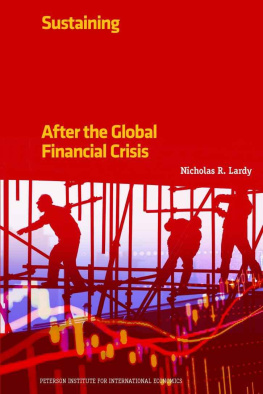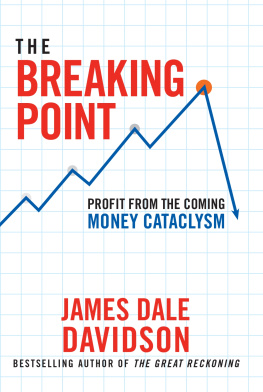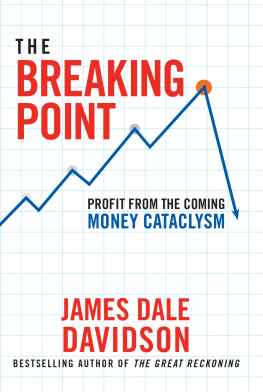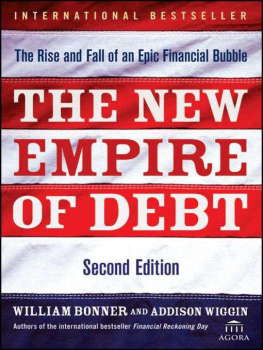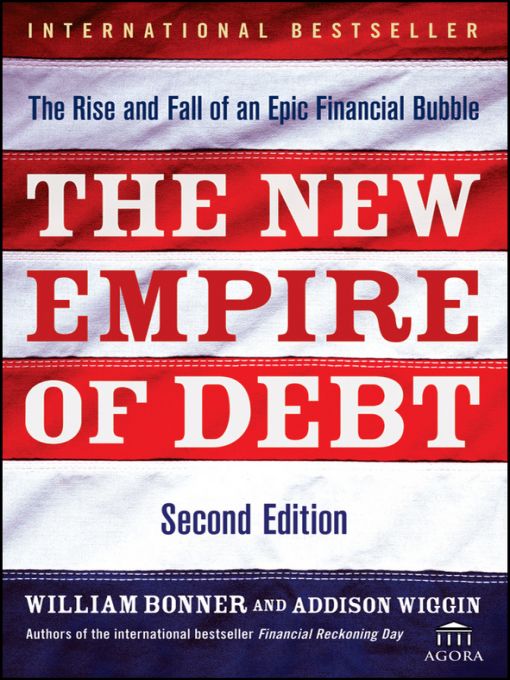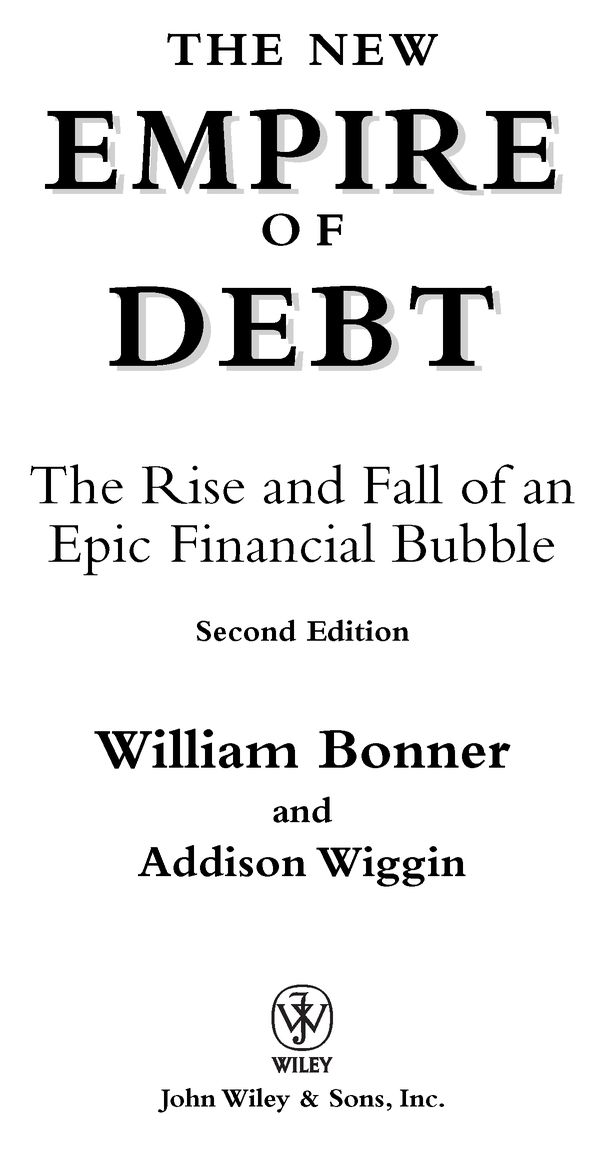Table of Contents
Praise for the First Edition ofEmpire of Debt
[T]ells you whats really going on in the global economy.
The Economist
Empire of Debt is a wake-up call for all investors. Bonner and Wiggin masterfully illustrate why we should all take a much closer look at what our future holds.
Marketwatch
Tells the story of how all empires are eventually undone by the same vain overreaching.
Times of London
Read [Empire of Debt] and your views of the world around you will no longer be the same.
Nassim Nicholas Taleb Author of The Black Swan
The doom mongering is leavened with some waspishly witty writing.
The Daily Telegraph
The authors describe with sardonic humorand no small amount of name callinghow America has become an overfed, imperial has-been and economic basket case.
SmartMoney.com
In addition to being accomplished financial analysts, Bonner and Wiggin are talented historical writers. And they put this talent to work in the cause of examining the political and economic effects of empire.
The Huffington Post
INTRODUCTION
The Bubble Empire
The will of Zeus is moving toward its end.
The Illiad
One day in early spring 2005, we traveled by train from Poitiers to Paris and found ourselves seated next to Robert Hue, head of the French Communist Party and a senator representing Val dOise. He sat down and pulled out a travel magazine, just as any other traveler would. Aside from one Bolshevik manqu who stopped by to say hello, no one paid any attention. A friend reports that he was on the same train a few months ago with then Prime Minister, Jean-Pierre Raffarin, who was accompanied by only a single aide.
Many years ago, when the United States was still a modest republic, American presidents were likewise available to almost anyone who wanted to shoot them. Thomas Jefferson went for a walk down Pennsylvania Avenue, alone, and spoke to anyone who came up to him. John Adams used to swim naked in the Potomac. A woman reporter got him to talk to her by sitting on his clothes and refusing to budge.
But now anyone who wants to see the president must have a background check and pass through a metal detector. The White House staff must approve reporters before they are allowed into press conferences. And when the U.S. head of state travels, he does so in imperial style; he moves around protected by hundreds of praetorian guards, sharpshooters on rooftops, and thousands of local centurions. When President Clinton went to China in 1998, he took with him his family, plus 5 Cabinet secretaries, 1 6 members of Congress, 86 senior aides, 150 civilian staff (doctors, lawyers, secretaries, valets, hairdressers, and so on), 150 military staff (drivers, baggage handlers, snipers, and so on), 150 security personnel, several bomb-sniffing dogs, and many tons of equipment, including 10 armored limousines and the blue goose, Clintons bulletproof lectern.
Getting the presidential entourage and its armada of equipment to China and back, the Air Force flew 36 airlift missions on Boeing 747, C-141, and C-5 aircraft. The Pentagons cost of the China trip was $14 million. Operating Air Force One alone costs over $34,000 an hour.
Today, the president cavalcades around Washington in an armored Cadillac. The limousine is fitted with bulletproof windows, equally sturdy tires, and a self-contained ventilation system to ward off a biological or chemical attack.
The Secret Servicethe agency charged with preserving the president among the livingemploys over 5,000 people: 2,100 special agents, 1,200 Uniformed Division employees, and 1,700 technical and administrative wonks. Everywhere the president goes, his security is handledby thousands of guards and aides, secure compounds, and carefully orchestrated movements. Security was so tight during a visit to Ottawa, Canada, in 2004 that some members of Parliament were refused entry into the building for lack of a special one-time security pass, an act apparently contradictory to the laws of Canada.
In late 2003, when Bush deigned to visit the British Isles, an additional 5,000 British police officers were deployed to the streets of London to protect him. Parks and streets were shut down. Snipers were visible on the royal rooftop.
THE THEME OF THIS BOOK IN A NUTSHELL
Watching the news is a bit like watching a bad opera.You can tell from all the shrieking that something very important is supposed to be happening, but you dont quite know what it is.What youre missing is the plot.
Let us begin by noticing that this is a comic opera that seems as though it might veer into tragedy at any moment. The characters on stage are familiar to usconsumers, economists, politicians, investors, and businessmen. They are the same hustlers, clowns, rubes, and dumbbells that we always see before us. But in todays performance they are doing something extraordinary: They are the richest people on the planet, but they have come to rely on the savings of the worlds poorest people just to pay their bills. They routinely spend more than they makeand think they can continue doing so indefinitely. They go deeper and deeper in debt, believing they will never have to settle up. They buy houses and then mortgage them outroom by room, until they have almost nothing left. They invade foreign countries in the belief that they are spreading freedom and democracy, and depend on lending from Communist China to pay for it.
But people come to believe whatever they must believe when they must believe it. All these conceits and illusions that we find so amusing in the Daily Reckoning (www.dailyreckoning.com), come not from thinking, but from circumstances. As they say on Wall Street,markets make opinions, not the other way around.The circumstance that makes sense of this strange performance is that the United States is an empirewhether we like it or not. It must play a well-known role on the world stage, just as you and I must play our roles, not because we have thought our way to them, but simply because of who we are, where we are, and when we are. Primitive people play primitive roles.They are no less intelligent than the rest of us, but they would be out of character if they began doing calculus.They have their parts to play just as we do. Sophisticated people play sophisticated roles.They are no smarter than anyone else, but you still dont expect them to wear bones through their noses. We, citizens of the last great empire, have our roles to play too, and the empire itself, must do what an empire must do.
Institutions have a way of evolving over timeafter a few years, they no longer resemble the originals. Early in the twenty-first century, the United States is no more like the America of 1776 than the Vatican under the Borgia popes was like Christianity at the time of the Last Supper, or Microsoft in 2009 is like the company Bill Gates started in his garage.
Still, while the institutions evolve, the ideas and theories about them tend to remain fixed; it is as if people hadnt noticed. In America, all the restraints, inhibitions, and modesty of the Old Republic have been blown away by the prevailing winds of the new empire. In their place has emerged a vainglorious system of conceit, deceit, debt, and delusion.


